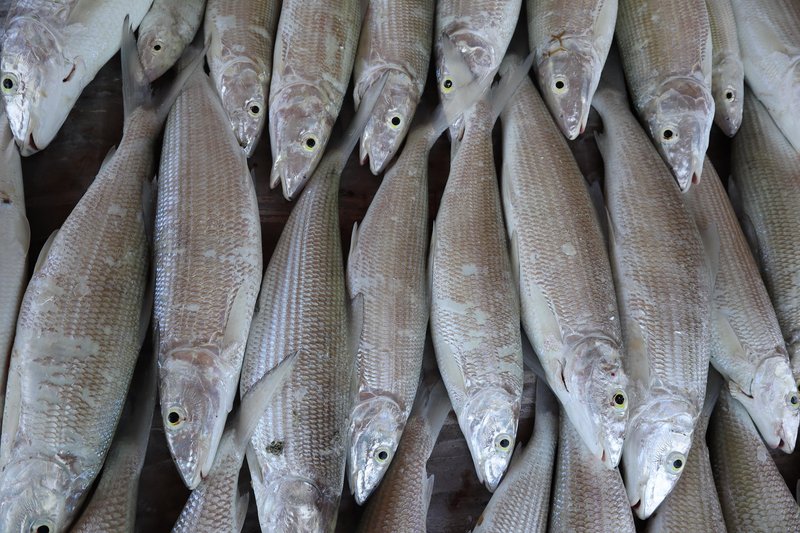July Webinar: Topics at the nexus of climate change, fisheries & blue foods
11 AM–12 PM | Online | PublicA webinar series highlighting the impact of climate change on fisheries and aquaculture and the communities who depend on them.

July 2024 Webinar: Resilience in Small-Scale Fisheries
Jointly hosted by the UN Ocean Decade Programs Blue Food Futures, Fisheries Strategies for Changing Oceans and Resilient Ecosystems (FishSCORE), Sustainability, Predictability, and Resilience of Marine Ecosystems (SUPREME), and Sustainability of Marine Ecosystems through Global Knowledge Networks (SmartNet).
This webinar series highlights current efforts and challenges along the spectrum of the climate-fisheries nexus. Presentations and discussions will range from data-driven efforts being undertaken around the world to better understand oceanographic and biological changes affecting fisheries, to how the results can be used to inform fisheries management, aquaculture, and sustainable food decisions, to the many ways people and broader communities are being impacted by and adapting to the way these changes impact marine ecosystems and marine resource use.
Presentation 1: The effects of self-governance arrangement on the climate change resilience of small-scale fisheries in Nayarit, Mexico
Small-scale fisheries (SSF) are vital for global livelihoods and food security yet are especially vulnerable to environmental changes due to marginalization and reliance on natural resources. To confront these challenges, SSF adopt various formal (e.g., fishing cooperatives) and informal (e.g., patron-client relationships) self-governance arrangements, significantly influencing their fishing behavior and resilience to environmental stressors, including climate change. However, limited evidence exists on how these social structures impact fishers’ adaptive capacity and responses to ongoing climate change impacts. Using data from 445 surveys across six communities in Nayarit, we explore the influence of self-governance arrangements, including fishing cooperatives and patron-client relationships, on fishers' adaptations and adaptive capacity to climate change impacts. Our findings reveal the prevalence of coping strategies, such as borrowing money and increasing fishing effort, highlighting the importance of patrons in providing access to essential assets. However, patron-client relationships exhibit lower social organizational capacity, potentially impacting community cohesion. A multinomial logistic mixed model shows that both patron-client relationships and fishing cooperatives are associated with unsustainable fishing practices as climate change adaptation, suggesting potential maladaptation. Minimal differences are observed between these two governance arrangements, indicating deficiencies in the functioning of many fishing cooperatives in Nayarit. As climate change impacts escalate, understanding how management systems and social structures shape SSF responses is crucial.
Webinar Presenter: Xochitl Elías is a Ph.D. student in Marine Sciences, Technology, and Management at the University of Vigo, interested in understanding human-nature interactions using interdisciplinary approaches. Her Ph.D. focuses on the adaptation of small-scale fisheries to the ongoing impacts of climate change through two case studies: Mexico and Japan. Since 2022 she has been the coordinator of the Central American node of the UN Ocean Decade Early Career Ocean Professional (ECOP Programme).
Presentation 2: Ecological and Social Dynamics of Compressor Diving Fisheries in Costa Rica
Dive fishing is a common but unknown coastal practice in Central America. Particularly on the North Pacific coast of Costa Rica, this activity is often carried out with air compressors, this activity generally has a significant ecological impact, targeting species in coral and rocky environments. The lack of proper training for fishers using this equipment leads to accidents and fatalities. Despite its economic benefits, this fishery is associated with illegal behavior in Marine Protected Areas (MPAs) and lacks proper monitoring and catch data. Parrotfish, which are one of the main target species, play a critical role in the health of coral reefs and represent 47% of the fishery's landings, making management of this species essential. A social-ecological approach was adopted, using surveys and interviews to understand the dynamics and impacts of the fishery. In addition, stable isotope analysis was used to track illegal fishing behavior within MPAs, providing valuable insights for better fisheries management.
Webinar Presenter: Paola Díaz, a Honduran biologist, is a researcher at the Centro de Investigaciones en Ciencias del Mar y Limnología (CIMAR) at the University of Costa Rica. Her work focuses on fisheries management and ecological research, particularly in coastal areas, adaptation to environmental change, and science communication. As an associate researcher at CIMAR, she actively contributes to advancing the understanding of marine ecosystems. She is also the coordinator of ECOP-Honduras, working closely with the Central American node to facilitate interdisciplinary research and promote inclusive initiatives. Her overall goal is to integrate scientific research with social and environmental efforts to promote sustainable management of marine resources.
